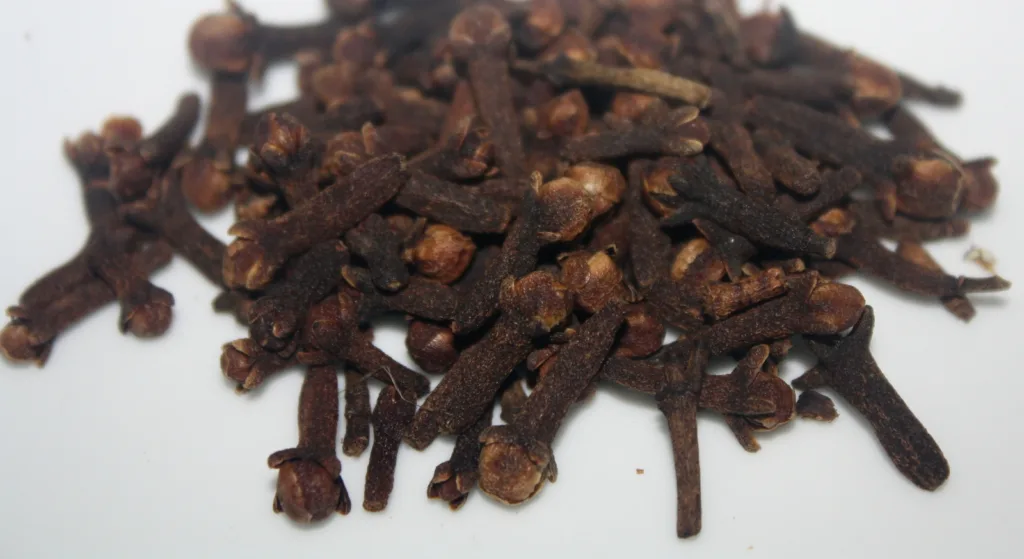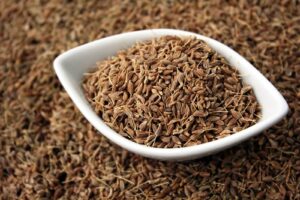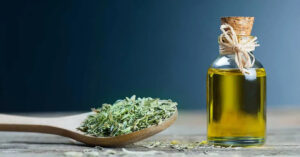History Of Cloves
Syzygium aromaticum, a tropical evergreen tree native to Indonesia’s Maluku Islands (commonly referred to as the Spice Islands), produces dried flower buds that are used to make cloves. They were formerly among the most precious commodities in the world and have been used as a spice for ages.
Cloves are known to have originated in China, where they were used as a medicinal and breath freshener throughout the Han Dynasty (206 BC–220 AD). During this period, cloves were also sold to India and the Middle East, where they were utilised in both medicine and food.

They were one of the most sought-after spices during the Middle Ages in Europe. They were utilised in medicine-making, culinary flavouring, and meat preservation. In addition, cloves were frequently presented as gifts to nobility and royalty as a status symbol.
The Portuguese and Spanish controlled the European spice trade in the fifteenth and sixteenth centuries. The Portuguese took control of the clove trade after becoming the first to arrive in the Maluku Islands. At the beginning of the 17th century, nevertheless, the Dutch eventually gained command of the clove trade.
For more than a century, the Dutch were the only ones allowed to trade cloves. They achieved this by removing clove trees from every island—all but Ambon and Ternate. Along with controlling clove shipping to Europe, the Dutch also established high prices for the spice.
The French started a smuggling operation in the early 1800s to get clove tree seeds to the islands of Pemba and Zanzibar. As a result, cloves were grown in various parts of the world, ending the Dutch monopoly on the clove trade.
They are now farmed all over the world, including Madagascar, Indonesia, Zanzibar, India, and Sri Lanka. They are still widely utilized in many different types of cuisine as spices. Toothpaste, cosmetics, and perfumes are just a few of the items that include cloves.
The Trade in Spices and Cloves
From the fifteenth to the seventeenth century, one of the most significant economic forces in the globe was the spice trade, in which cloves played a significant part. In addition to being a significant source of income for European nations, the spice trade contributed to the global dissemination of new ideas and cultures.
Nutritional Value of Cloves
Cloves abound in Manganese, a mineral that aids in the regulation of the enzymes in your body that aid in bone repair and hormone production.. In addition, manganese has anti-oxidant properties that shield your body from damaging free radicals, which are unstable atoms that damage cells.
Cloves are also a great source of vitamin k , Potassium , Beta -carotene and Eugenol.
Nutrient value of cloves :
| Nutrient | Amount per 1 teaspoon of cloves |
|---|---|
| Calories | 6 |
| Protein | Less than 1 gram |
| Fat | Less than 1 gram |
| Carbohydrates | 1 gram |
| Fiber | 1 gram |
| Sugar | Less than 1 gram |
Benefits
Popular as a spice, cloves may offer several health advantages. They have a lot of antioxidants, which can help shield the body from harm brought on by free radicals. Moreover, cloves may have antiviral, antibacterial, and anti-inflammatory qualities.
Cloves may have the following health advantages:
Better Oral Health
Cloves have antibacterial properties that can aid in the battle against oral germs and fungus. • Cloves have also been demonstrated to be useful in treating toothaches and oral pain. This can help to lower plaque and gingivitis, as well as perhaps help to prevent tooth decay and gum disease. Eugenol, a substance having analgesic and anti-inflammatory qualities, is assumed to be the cause of this.
Reduced Inflammation
• Eugenol, a substance with strong anti-inflammatory qualities, is present in cloves. It has been demonstrated that eugenol is useful in lowering inflammation linked to a number of ailments, such as inflammatory bowel disease, Asthma, and Arthritis. Cloves may also aid in lowering inflammation linked to cancer and cardiovascular disease.
Enhanced Blood Sugar Regulation:
Compounds in cloves have the potential to enhance insulin sensitivity and blood sugar regulation. Those who have diabetes or prediabetes may benefit from this.Additionally, cloves may lessen the chance of developing diabetes-related problems like kidney, heart, and stroke.
Lowers Cancer Risk
• Antioxidants found in cloves may aid in defending the body against cancer. These antioxidants function by scavenging free radicals, which are erratic substances capable of causing cellular harm.
The primary active ingredient in cloves, eugenol, has been demonstrated in lab tests to have anti-cancer properties. It has been demonstrated that eugenol kills cancer cells and stops tumour growth.
Enhances Liver Health:
Antioxidants and other substances in cloves can help shield the liver from harm. • Those with liver diseases such fatty liver disease, hepatitis, and cirrhosis may benefit from cloves. These components can also assist to improve liver function.
Reduces ulcers :
Cloves may help shield your stomach from ulcers, according to several research. The weakening of the mucus layers that shield your stomach lining is the main cause of ulcers. Large clove consumption thickens this mucus, reducing the chance of developing ulcers and promoting ulcer healing, according to preliminary study.
Additional Possible Health Advantages
• Benefits of using cloves include: improving digestion and reducing nausea; strengthening the immune system and warding off infections; reducing pain and inflammation related to headaches, migraines, and muscular aches; and enhancing respiratory health by easing coughs and colds.
It’s crucial to remember that additional study is required to verify all of the possible health advantages of cloves. Cloves, however, appear to be a safe and healthful spice that can be included in a balanced diet based on the information that is now available.
Uses of cloves
Culinary Uses
• Often used in curries and other savoury dishes, cloves are a popular component in Indian cooking.
• Chinese cuisine also makes use of cloves, which are a main component of five-spice powder.
• You can use cloves to add flavour to meats like lamb, cattle, and pig as well as to vegetables like sweet potatoes, carrots, and squash.
• Popular baked items include cakes, pies, and cookies that contain cloves as an ingredient.
• You may also add cloves to flavour drinks like tea, cider, and mulled wine.
Here are a few particular instances of using cloves in food:
• To add a warm, spicy flavour to a pot of stew or soup, add a few whole cloves.
• Grind the cloves and add them to a mixture of garam masala or curry powder.
• Before roasting, stud a gammon with whole cloves.
• To add a spicy taste to pickles, add cloves to the brine.
• To add a cosy and aromatic flavour to pumpkin pie or any other baked treat, add cloves.
• For a festive and flavorful drink, add cloves to a pot of cider or mulled wine.
Other Uses
Cloves can be used to manufacture clove oil, which is applied externally to treat pain and inflammation or used in aromatherapy; clove powder can be used to flavour food or make toothpaste.Another usage for cloves is to create a homemade natural bug repellant.
Here are a few particular instances of additional uses for cloves:
• To create a cosy and welcoming aroma, add a few drops of clove oil to a diffuser.
• To treat aches and pains in the muscles, dilute clove oil with a carrier oil, like jojoba oil, and apply it topically.
To make a natural toothpaste with antibacterial and anti-inflammatory qualities, add ground cloves to the toothpaste formula.
To keep moths and other insects away, put a few cloves in a sachet and hang it in a closet.
Safe Daily Dosage
Clove dosage that is safe to take each day varies according on age, health, and other medications consumed. Nonetheless, the majority of experts advise individuals to limit their daily clove consumption to 10 grammes. This is roughly equal to one teaspoon of ground cloves or two teaspoons of whole cloves.
If you eat more than 10 grammes of cloves a day, you may get adverse effects such headaches, dizziness, vomiting, and seizures. When clove poisoning is severe, it can be lethal.
Since kids are more susceptible to the effects of cloves than adults are, it’s crucial to exercise extra caution while giving them cloves.
It is recommended that children ingest no more than 1 gramme of cloves per day, which is roughly 1/4 teaspoon of whole cloves or 1/8 teaspoon of crushed cloves.
It is noteworthy to mention that cloves have the potential to interact with some drugs, including blood thinners and diabetes treatments. It is advisable to consult your doctor before ingesting cloves if you are taking any drugs.
Precautions to Take While Consuming Cloves
Spices like cloves are tasty and adaptable, and they may have several health advantages. Cloves should be consumed in moderation, though, and certain safety measures should be taken to prevent any negative consequences.
When eating cloves, remember to take the following safety measures:
Refrain from eating a lot of cloves: Eugenol, a substance found in cloves, has a significant potential for toxicity. Repercussions such as upset stomach and vomiting might occur when more than 10 grammes of cloves are used daily.
If you have sensitive stomach, proceed with caution. Since cloves can irritate the lining of the stomach, it’s best to avoid them altogether or use them sparingly if you have a sensitive stomach.
Be mindful of any possible drug interactions. Certain drugs, like blood thinners and diabetes medications, may interact with cloves. It is advisable to discuss any medicine you are taking with your doctor prior to swallowing cloves.
If you are nursing a baby or pregnant, stay away from cloves. Cloves’ safety during pregnancy and nursing has not been well studied, therefore it is advisable to err on the side of caution and stay away from them.
Frequently Asked Questions
Q:What are cloves ?
A: Syzygium aromaticum, the clove tree, produces dried flower buds that are known as cloves. They are a well-liked spice that go well with savoury and sweet foods. Cloves smell and taste strongly of sulphur.
Q: What advantages do cloves provide for your health?
A: Antioxidants and other healthy substances can be found in cloves. They might be antiviral, antibacterial, and anti-inflammatory. Additionally, cloves have been demonstrated to lower blood sugar, strengthen teeth, and shield the liver from harm.
Q: How can cloves be used in cooking?
A wide range of foods, including meats, veggies, soups, stews, curries, and baked products, can be prepared using cloves. To use cloves, just add them to the meal while it’s cooking, whole or ground. You can either leave the ground cloves in the dish or remove the whole cloves before serving.
Q: How much of cloves can I safely use everyday ?
A: The quantity of cloves you use will vary according on the meal you’re creating and your own preferences. Take a small bit at first and add more to taste. Generally speaking, two whole cloves are equal to 1/4 teaspoon of powdered cloves.
Q: Is it safe for anyone to eat cloves?
A: Consuming cloves in moderation is generally safe for most people. It is crucial to remember that cloves have the potential to irritate mucous membranes and skin. It’s also crucial to refrain from ingesting a lot of cloves because this may cause upset stomach and other negative effects.
Q: If I’m expecting or nursing, can I use cloves?
A: If you are pregnant or nursing, it is important to consult your doctor before ingesting cloves. The safety of cloves during pregnancy and lactation has not been well studied.
Q:Can cloves cause any drug interactions?
A: Certain drugs, including blood thinners and diabetes medications, may interact with cloves. It is advisable to discuss any medicine you are taking with your doctor prior to swallowing cloves.
Q: What’s the best way to keep cloves?
A dark, cool room is the best place to keep cloves in an airtight container. Cloves can be stored whole for up to two years and crushed for up to six months.
Reference: http://www.wikipedia.com







